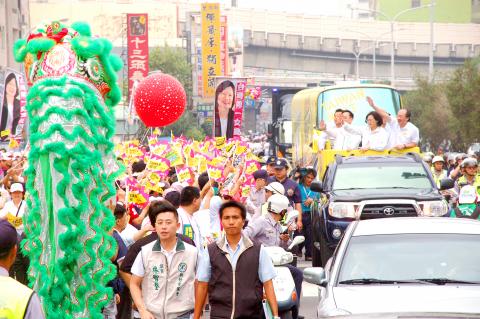As Democratic Progressive Party (DPP) Chairperson Tsai Ing-wen’s (蔡英文) presidential election campaign trip took her to areas with heavy Hakka populations in northern Taiwan yesterday, the party said it feels that it has never had as good an opportunity as this year to make strides in securing Hakka votes in the election.
One of the main reasons for that confidence is that, unlike previous standard-bearers, Tsai is of Hakka descent.
Tsai said yesterday in Hsinchu, one of the three main Hakka constituencies in northern Taiwan, along with Miaoli and Taoyuan, that her party planned to promote the Hakka language and eventually designate it as one of the national languages if she were elected president in January.

Photo: Wang Chin-yi, Taipei Times
Her 11-day campaign trip along the west coast was approaching Taipei, where the trip will draw to a close today.
“After a successful campaign in southern Taiwan, people said that I would receive a lukewarm welcome as the group traveled northward, but I haven’t felt that,” Tsai told supporters on a campaign stop at Jhongli (中壢), Taoyuan County.
Hakka are the second-largest ethnic group in Taiwan behind Hoklo. According to a Council of Hakka Affairs survey, 18.1 percent of the nation’s 23 million nationals, or 4.2 million people, are of Hakka descent.
In past elections, most Hakka in northern Taiwan favored the Chinese Nationalist Party (KMT). A recent DPP survey shows that it trails by about 10 percent among Hakka voters in that region.
While Hakka communities in southern Taiwan’s Pingtung and Kaohsiung gave Tsai and her running mate Su Jia-chyuan (蘇嘉全) a warm welcome last week because the pair hail from Pingtung, the DPP understood that winning Hakka votes in the north would be a tall order.
Tsai said that the DPP has long been seen as a party dominated by Hoklo people, which was why it has not been successful in Hakka constituencies in the past.
However, that was probably a wrong perception, because Hoklo people and the DPP neither ignore nor discriminate against the Hakka, Tsai said.
Speaking in Hsinchu yesterday, Tsai said the Council of Hakka Affairs and the Hakka TV Service were both founded between 2000 and 2008, when the DPP was in power. The DPP administration also helped several universities establish Colleges of Hakka Studies, she added.
Being a Hakka, Tsai said she would like to do more to promote the Hakka language and culture as well as improving infrastructure in Hakka constituencies.
Earlier in Miaoli, she talked about reviving local economies by developing industries with local characteristics, such as wood carving. In Hsinchu, she pledged to make the region, which is already known as Taiwan’s Silicon Valley, the technology capitol of Taiwan by expanding the size and diversity of the Hsinchu Science Park.
Although Tsai does not speak fluent Hakka, Hakka people seemed to see her as one of their own, DPP legislative candidate Yang Yiong Cong-ziin (楊長鎮) said.
“It appeared that Hakka women — young and old — felt that they could identify with Tsai and they believe in her, and maybe that could make a difference in the election,” said a Tsai campaign adviser, who wished to remain anonymous because he was not authorized to speak on the matter.
The DPP see the Hakka constituencies as important battlegrounds, with former Hsinchu County commissioner Lin Kwang-hua (林光華), a Hakka, saying that Taoyuan, Hsinchu and Miaoli could be the deciding electoral region of January’s presidential election, despite widespread belief that central Taiwan would be the game-changer.

Alain Robert, known as the "French Spider-Man," praised Alex Honnold as exceptionally well-prepared after the US climber completed a free solo ascent of Taipei 101 yesterday. Robert said Honnold's ascent of the 508m-tall skyscraper in just more than one-and-a-half hours without using safety ropes or equipment was a remarkable achievement. "This is my life," he said in an interview conducted in French, adding that he liked the feeling of being "on the edge of danger." The 63-year-old Frenchman climbed Taipei 101 using ropes in December 2004, taking about four hours to reach the top. On a one-to-10 scale of difficulty, Robert said Taipei 101

Nipah virus infection is to be officially listed as a category 5 notifiable infectious disease in Taiwan in March, while clinical treatment guidelines are being formulated, the Centers for Disease Control (CDC) said yesterday. With Nipah infections being reported in other countries and considering its relatively high fatality rate, the centers on Jan. 16 announced that it would be listed as a notifiable infectious disease to bolster the nation’s systematic early warning system and increase public awareness, the CDC said. Bangladesh reported four fatal cases last year in separate districts, with three linked to raw date palm sap consumption, CDC Epidemic Intelligence

Two Taiwanese prosecutors were questioned by Chinese security personnel at their hotel during a trip to China’s Henan Province this month, the Mainland Affairs Council (MAC) said yesterday. The officers had personal information on the prosecutors, including “when they were assigned to their posts, their work locations and job titles,” MAC Deputy Minister and spokesman Liang Wen-chieh (梁文傑) said. On top of asking about their agencies and positions, the officers also questioned the prosecutors about the Cross-Strait Joint Crime-Fighting and Judicial Mutual Assistance Agreement, a pact that serves as the framework for Taiwan-China cooperation on combating crime and providing judicial assistance, Liang

US climber Alex Honnold left Taiwan this morning a day after completing a free-solo ascent of Taipei 101, a feat that drew cheers from onlookers and gained widespread international attention. Honnold yesterday scaled the 101-story skyscraper without a rope or safety harness. The climb — the highest urban free-solo ascent ever attempted — took just more than 90 minutes and was streamed live on Netflix. It was covered by major international news outlets including CNN, the New York Times, the Guardian and the Wall Street Journal. As Honnold prepared to leave Taiwan today, he attracted a crowd when he and his wife, Sanni,